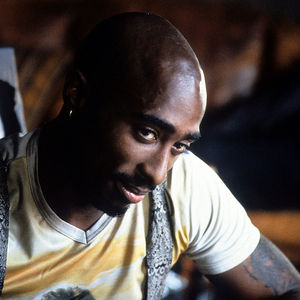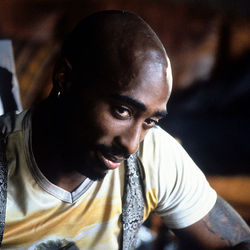💰Tupac (2Pac) Net worth: $200 Thousand
Tupac (2Pac) Net Worth: Tupac was an American rapper and actor who had a net worth of $200 thousand at the time of his death in 1996. For a full explanation of Tupac's tangled finances at the time of his death, please read the detailed paragraph at the bottom of this article. A hugely successful rap artist and actor, Tupac was known for his highly political and socially conscious lyrics. To date, he has sold more than 75 million records internationally. Tragically he was murdered in Las Vegas in 1996 at the age of 25 in a crime that is still not solved today.
He was born Tupac Amaru Shakur on June 16, 1971 in New York City. Tupac started his music career as a roadie, backup dancer, and MC for the alternative hip hop group Digital Underground. He became an international music sensation after launching a solo career. During his life, Tupac released four studio albums; 2Pacalypse Now (1991), Strictly 4 My N.I.G.G.A.Z. (1993), Me Against the World (1995) and All Eyez On Me (1996). The 1996 album Makaveli: The Don Killuminati: The 7 Day Theory was released posthumously. Several more albums would eventually be released after his death. Tupac was deeply connected to the so-called East Coast/West Coast hip hop rivalry during the latter part of his career. He was often engaged in conflicts with other rappers, producers and record-label staff members, most notably with Notorious B.I.G., Puff Daddy and their Bad Boy Records label. Most people believe that this rivalry with B.I.G. and Diddy is what ultimately resulted Tupac being shot multiple times in a drive-by shooting in Las Vegas, Nevada on September 7, 1996. He passed away six days later.
Today Tupac is one of the best-selling music artists in the world. He was most appreciated for using politically and socially conscious themes in his songs sometimes initiated by his family experiences. His mother was a member of the Black Panther Party. Tupac was also an actor who appeared in several movies including 1992's Juice and 1993's Poetic Justice.
Tupac's Net Wet Worth and Financial Problems at Death: Despite selling $60 million worth of albums in 1996 alone, Tupac's finances were a mess at the time of his death. Within weeks of his death, a forensic lawyer would later discover that Tupac had very little to show for his enormous success. He owned no real estate, had no retirement accounts, no stocks… He did not own the Woodland Hills mansion he lived in at the end of his life. His primary assets were a five-figure life insurance policy which went to his half-sister, two cars and a single checking account that contained $105,000. Court fees and taxes consumed all of those assets in short order. The only asset of value that Afeni Shakur received from her son's estate soon after his death was a Mercedes Benz SL 500.
Gramercy Pictures/Getty Images
Technically speaking, Tupace was $4.9 million in debt to his record company Death Row when he died. Because he died without a will, Afeni took control of the estate. She would eventually sue Death Row for withholding royalties and failing to deliver advances promised under his contract. Death Row denied the claims, saying the Tupac's financial problems were a result of his lavish spending habits. The company produced records showing that in the year preceding his death, Death Row loaned Tupac millions of dollars to fund his lifestyle. The company lent him several hundred thousand dollars to buy himself cars and rent several homes for himself and family members. Death Row also paid a $300,000 tab that Tupac had wracked up at a single Los Angeles hotel. The label also fronted a monthly $16,000 payment that Tupac arranged to support his mother. Finally, the label fronted $2 million to cover Tupac's album and video costs related to the album "Makaveli: The Don Killuminati". When Tupac's mother threatened to forbid the release of that album until the financial questions were answered, Death Row's distributor Interscope Records immediately paid his estate $3 million. Interscope also agreed to pay his estate $2 million in one year and to increase his royalty rate from 12% to 18%. Furthermore, Interscope forgave half of the $4.9 million debt that Death Row claimed it was owed. Jimmy Iovine was instrumental in ironing out an amicable resolution at a very tense time.
Over the next several decades, Tupac's estate would earn tens of millions off the posthumous release of Tupac albums, merchandise sales and various other forms of image licensing.














